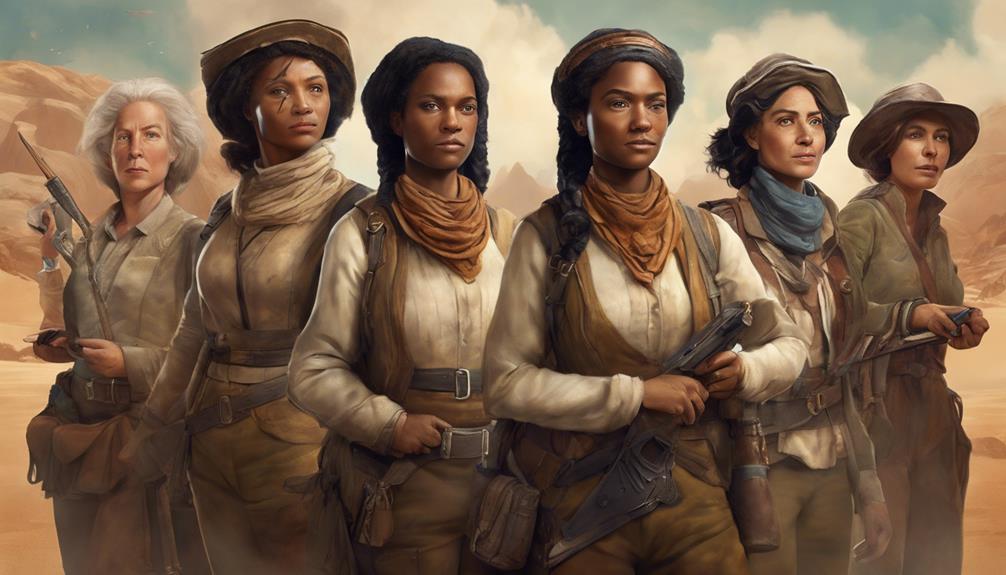The history of exploration is often dominated by tales of male adventurers, yet the contributions of famous female explorers are equally significant. From the daring exploits of Jeanne Baret to the remarkable journeys of Isabella Bird, these women have defied societal norms and pushed the boundaries of discovery. Their stories not only shed light on their individual achievements but also raise questions about the broader representation of women in exploration. As we uncover the lives and expeditions of these remarkable women, we are left pondering the complexities of their legacies and the impact they have had on shaping the narrative of exploration.
Key Takeaways
- Female explorers like Jeanne Baret and Sacagawea defied norms, showcasing bravery and significant contributions to scientific research.
- Trailblazing travelers like Isabella Bird and Nellie Bly challenged societal barriers, paving the way for future adventurers.
- Boundary-breaking adventurers such as Annie Londonderry and Amelia Earhart shattered gender stereotypes, inspiring women worldwide.
- Inspirational explorers Aloha Wanderwell and Gertrude Bell made remarkable contributions to geography, exploration, and women's empowerment.
Jeanne Baret (1740 – 1807)
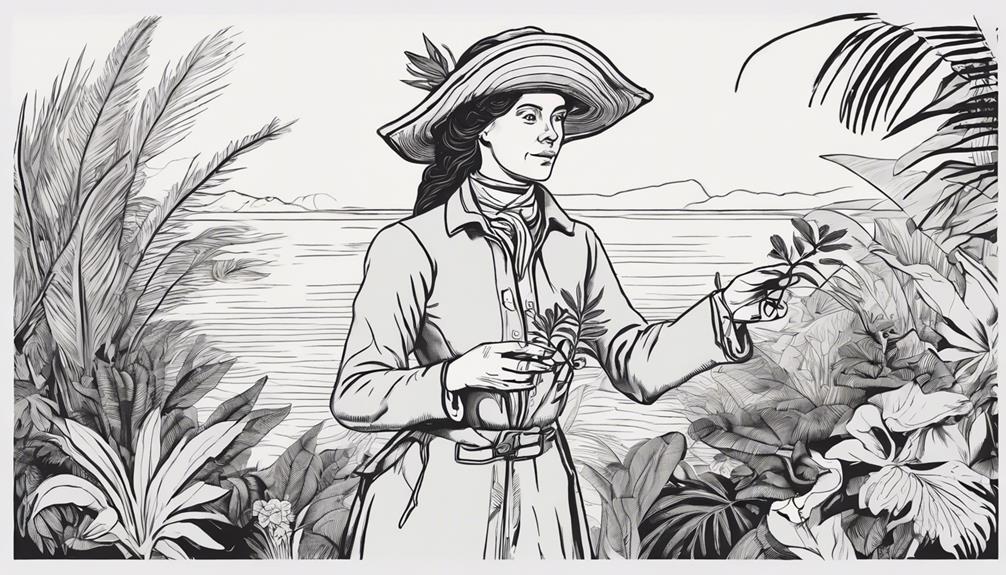
Jeanne Baret (1740 – 1807) defied societal norms by disguising herself as a man to participate in an expedition led by her partner, Philibert Commerson. Despite the French navy's prohibition against women on their ships, Baret managed to conceal her identity until the expedition reached Mauritius in the Indian Ocean. Baret's expertise in botany led her to collaborate closely with Commerson, even sharing a cabin to work on collecting and studying plant samples during the circumnavigation journey. After Commerson's death, Baret continued the expedition, becoming the first woman to circumnavigate the globe by ship.
Baret's remarkable journey not only showcased her determination to overcome gender barriers in exploration but also highlighted her significant contributions to scientific research during the expedition. By breaking traditional gender roles and societal expectations, Jeanne Baret stands out as a pioneering figure in the history of exploration, demonstrating courage and resilience in the face of adversity. Her story serves as an inspiration for future generations of explorers, emphasizing the importance of perseverance and passion in pursuing scientific endeavors.
Sacagawea (1788 – 1812)
Sacagawea (1788 – 1812), renowned for her pivotal role as a guide and translator during the Lewis and Clark expedition, played a crucial part in shaping early American exploration history. Despite her significant contributions, she faced challenges, such as becoming a child bride to trapper Toussaint Charbonneau at just 13 years old. Additionally, Sacagawea never received compensation for her invaluable assistance, highlighting the historical lack of acknowledgment for the efforts of many women in exploration. Her actions during the expedition, including the rescue of important documents that fell into the Sacagawea River, showcased her bravery and resourcefulness. In the early 20th century, Sacagawea transcended her historical role and became an icon for American suffragettes, symbolizing the strength and resilience of women in the face of adversity. Her story continues to inspire and shed light on the often unacknowledged contributions of women in the field of exploration.
Isabella Bird (1831 – 1904)
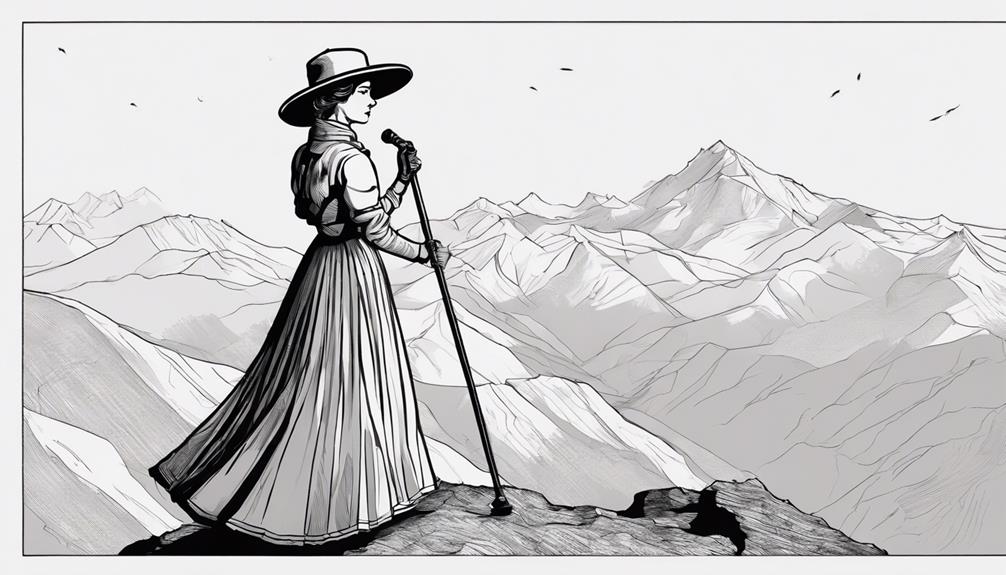
Isabella Bird (1831 – 1904) distinguished herself as a pioneering female explorer and travel writer, challenging societal norms and physical obstacles to document her extensive journeys to various countries. Despite battling chronic illness and a spinal tumor, Bird's adventurous spirit led her to explore regions like China, Japan, India, and Iran. In 1873, she embarked on a remarkable expedition through the Rocky Mountains in North America, showcasing her determination and courage. Bird's resilience and accomplishments defied the expectations placed on women in the 19th century, earning her respect as an explorer and writer. Her significant contributions to the field of exploration were recognized when she became the first woman to be elected a Fellow of the Royal Geographical Society in London. Through her captivating travel writings and photographs, Isabella Bird not only chronicled her own adventures but also served as an inspiration for future generations of female travelers, leaving a lasting legacy of exploration and empowerment.
Nellie Bly (1864 – 1922)
Continuing the legacy of pioneering female explorers, Nellie Bly (1864 – 1922) distinguished herself as a renowned investigative journalist, notably achieving a record-breaking trip around the world in just over 72 days. Bly's fearless pursuit of truth and justice led her to expose the harsh conditions prevalent in mental asylums and various institutions through her groundbreaking undercover reporting, challenging societal norms and advocating for reform. During her global journey, she had the opportunity to meet Jules Verne, the author of "Around the World in 80 Days," a meeting that inspired her remarkable expedition. Nellie Bly's work not only solidified her as a prominent figure in the world of journalism but also played a crucial role in breaking gender stereotypes, paving the way for future generations of female journalists and adventurers to follow in her pioneering footsteps.
Annie Londonderry (1870 – 1947)

Annie Londonderry (1870 – 1947) made history as the first woman to successfully circumnavigate the globe by bicycle in 1894-1895, showcasing unparalleled determination and courage in her epic journey. Securing sponsorships from various companies, she embarked on this adventurous trip during the bicycle craze, capturing the imagination of many. Completing her journey, Annie Londonderry received a $10,000 prize, a testament to her remarkable achievement. Through lectures and stories, she shared her experiences, inspiring others with her pioneering spirit as a female explorer and cyclist. Her feat not only broke gender barriers but also highlighted the strength and perseverance of women in the face of challenges. The table below outlines key aspects of Annie Londonderry's journey and her impact as a trailblazing adventurer.
| Aspect | Details |
|---|---|
| Achievement | First woman to circumnavigate the globe by bicycle |
| Sponsorship | Secured sponsorships for her journey |
| Recognition | Received a $10,000 prize for completing the trip |
| Inspiration | Inspired many with her determination and courage |
Bessie Coleman (1892 – 1926)
Bessie Coleman's pioneering achievements in aviation marked a significant milestone for African American and female pilots in the early 20th century. Despite facing discrimination, she became the first African American and Native American woman to earn a pilot's license. Here are three key points to consider about Bessie Coleman:
- Overcoming Barriers: Bessie Coleman had to attend flight school in France as she was rejected from aviation schools in the United States due to racial and gender biases. This highlights the challenges she had to overcome to pursue her passion for flying.
- International Recognition: By earning her pilot's license in France, Bessie Coleman became the first black person with an international pilot's license. Her achievement not only broke barriers in the aviation industry but also garnered international recognition for her skills and determination.
- Inspiring Future Aviators: Through her daring stunts and aerial shows, Bessie Coleman inspired countless individuals to pursue a career in aviation, paving the way for future generations of African American and female pilots. Her legacy continues to serve as an inspiration for aspiring aviators around the world.
Amelia Earhart (1897 – Disappeared 1937)
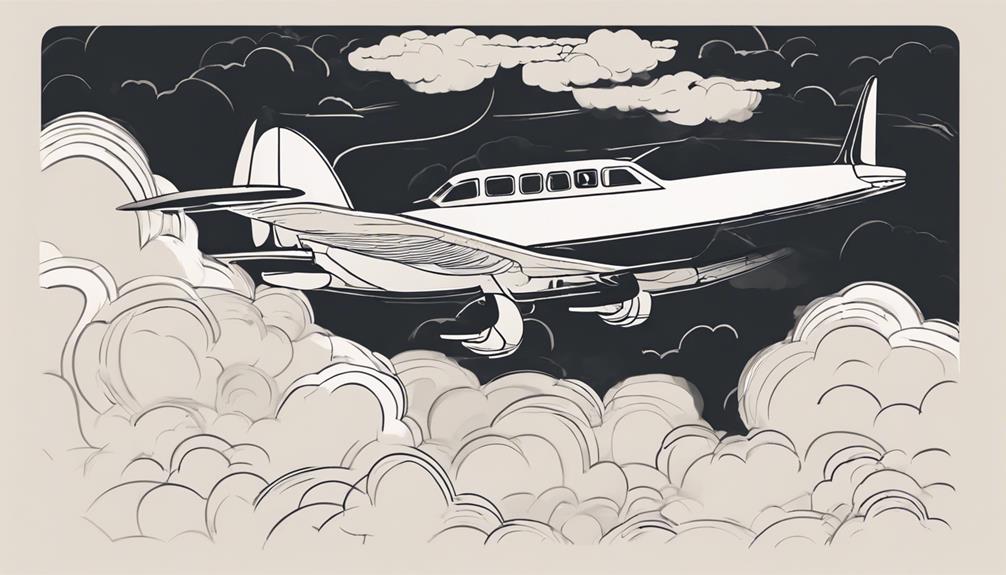
Amelia Earhart's groundbreaking accomplishments in aviation, including being the first woman to fly solo across North America in 1928, have solidified her legacy as a pioneering figure in the field. In 1932, she achieved another milestone by completing a nonstop solo transatlantic flight. Earhart's ambition led her to plan a daring circumnavigation of the globe in 1937. Tragically, during this world flight, along with her navigator Fred Noonan, she mysteriously disappeared, sparking one of the most enduring aviation mysteries.
Aside from her solo feats, Earhart was actively engaged in promoting the role of women in aviation. She played a significant role in the Nintety-Nines organization, which aimed to support and empower female aviators. Earhart's contributions to aviation and her courage in breaking barriers for women in a male-dominated field continue to inspire generations of aspiring pilots. Despite her disappearance in 1937, Amelia Earhart's legacy as a fearless and pioneering aviator remains indelible in the annals of history.
Aloha Wanderwell (1906 – 1996)
Aloha Wanderwell, a Canadian-American writer and filmmaker, achieved the remarkable feat of becoming the first woman to circumnavigate the globe by car, alongside her partner Walter Wanderwell. Wanderwell's legacy as the 'World's Most Travelled Girl' is a testament to her adventurous expeditions, which exemplified her fearless spirit and passion for exploration. Her pioneering journeys not only broke barriers but also inspired generations to push the boundaries of what was considered possible in the world of travel and adventure. Wanderwell's contributions to the field of exploration have left an indelible mark on history, showcasing the power of determination and courage in the face of challenges. Through her remarkable achievements, Aloha Wanderwell continues to be a symbol of resilience and audacity, illustrating the profound impact that one individual can have on shaping the course of exploration for years to come.
Gertrude Bell
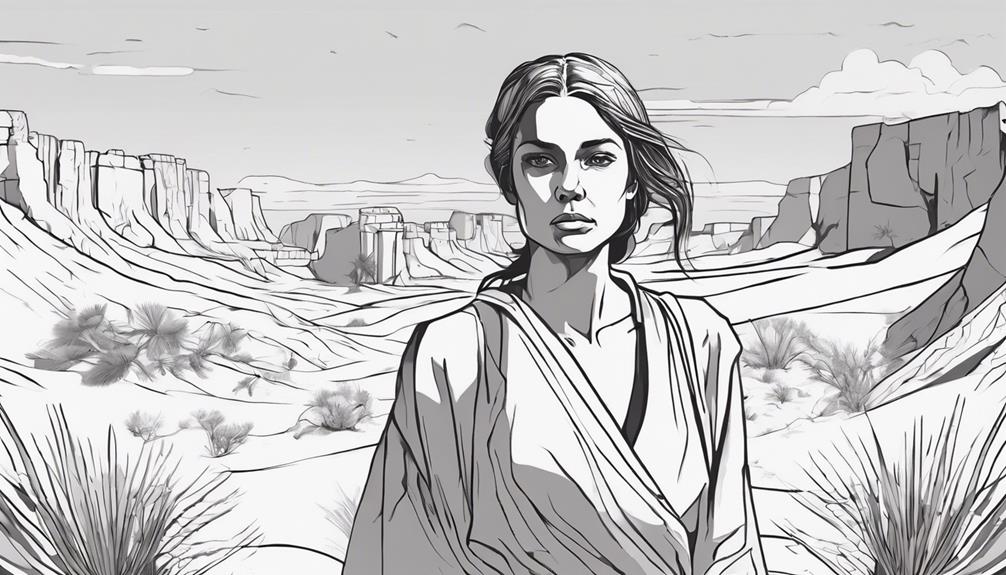
Gertrude Bell, a British archaeologist, linguist, and mountaineer, made significant contributions to geography and exploration through her travels in the Middle East and Central Asia. Her influence extended to shaping the political landscape of the region, notably in the establishment of Iraq in the 1920s. Bell's deep understanding of the cultures and landscapes she encountered is evident in the books she authored, which remain essential for those studying the Middle East today.
Below is a table highlighting key aspects of Gertrude Bell's life and achievements:
| Attribute | Details |
|---|---|
| Nationality | British |
| Expertise | Archaeologist, Linguist, Mountaineer |
| Regions | Middle East, Central Asia |
Gertrude Bell's dedication to exploration and geography garnered her numerous accolades and cemented her status as a trailblazing female explorer. Her legacy continues to inspire both adventurers and scholars, underscoring her enduring impact on our understanding of the world.
Junko Tabei
Junko Tabei's extraordinary achievements in mountaineering, including being the first woman to summit Mount Everest and conquer the Seven Summits, mark her as a trailblazer in the field. Despite encountering significant challenges during her Everest expedition, Tabei's dedication and perseverance paved the way for future female climbers by founding a women-only mountaineering club in Japan. Her enduring legacy is honored through the naming of an asteroid and a mountain in recognition of her pioneering impact on the world of mountaineering.
Junko Tabei's Achievements
Regarded as a trailblazer in the field of mountaineering, particularly for her historic achievements on Mount Everest and the Seven Summits, Junko Tabei's legacy continues to inspire and empower female climbers worldwide. Tabei's pioneering spirit and determination led to groundbreaking accomplishments that reshaped the landscape of mountaineering. Her notable achievements include:
- First Woman to Summit Mount Everest: Tabei made history in 1975 by becoming the first woman to reach the summit of Mount Everest, defying societal norms and setting a new standard for women in extreme sports.
- Conquering the Seven Summits: Tabei also holds the distinction of being the first woman to climb the Seven Summits, conquering the highest peak on each continent and solidifying her reputation as a trailblazer in mountaineering.
Challenges Faced
Facing significant gender discrimination and cultural barriers, Junko Tabei navigated a challenging path towards becoming the first woman to summit Mount Everest. In a society where mountaineering was predominantly male-dominated, Tabei encountered resistance and skepticism, being told that climbing was not a suitable pursuit for women. Additionally, within the cultural context of Japan, where traditional gender roles were deeply ingrained, Tabei's ambition to conquer the world's highest peak faced additional hurdles. Despite these obstacles, she founded the Ladies Climbing Club in 1969, advocating for women's participation in mountaineering. Tabei's perseverance and resilience, coupled with her unwavering determination, transcended financial constraints and societal expectations, ultimately leading her to etch her name in history as a trailblazer for women climbers.
| Challenges Faced | Impact on Junko Tabei | Outcome |
|---|---|---|
| Gender Discrimination | Motivated Tabei to prove herself | Achieved the first female Everest summit |
| Cultural Barriers | Fueled her determination | Founded Ladies Climbing Club |
| Financial Constraints | Tested her resolve | Overcame obstacles through perseverance |
Legacy and Impact
With an enduring legacy that resonates across mountaineering history, Junko Tabei's impact on the exploration world remains unparalleled. Tabei's achievements and contributions have left a lasting mark on the field of mountaineering, particularly for female climbers. Her legacy includes being the first woman to summit Mount Everest and conquer the Seven Summits, inspiring countless individuals to push their limits. Additionally, her founding of a women-only mountaineering club in Japan has empowered and supported women in pursuing their adventurous goals. Despite the challenges she faced during her Everest expedition, Tabei's legacy lives on through the recognition she has received, such as having an asteroid and a mountain named in her honor, solidifying her place as a trailblazer in the world of exploration.
Frequently Asked Questions
Who Is the Most Famous Female Explorer?
The most famous female explorer, in the context of Amelia Earhart's disappearance, Sacagawea's legacy, Freya Stark's travels, Gertrude Bell's adventures, Isabella Bird's writings, Nellie Bly's record-breaking journey, Mary Kingsley's explorations, Annie Smith Peck's mountaineering, Marianne North's botanical expeditions, and Alexandra David Neel's spiritual quests, is subject to interpretation. Each woman contributed uniquely to the field of exploration, leaving a lasting impact on history and inspiring future generations of adventurers.
Who Was the First Female Explorer?
Pioneering women have long been at the forefront of historic journeys, breaking boundaries in exploration. The first female explorer, Jeanne Baret, exemplifies the spirit of female pioneers and trailblazing adventurers. Her expedition marked a significant exploration milestone and solidified her place as a forgotten explorer deserving recognition. These women adventurers left an exploration legacy, inspiring future generations to push the boundaries of discovery and challenge traditional gender roles in exploration.
Who Was the Famous Woman Navigator?
A notable figure in maritime history and world exploration, the famous woman navigator, Jeanne Baret, demonstrated exceptional navigational skills during early ocean voyages. She embarked on famous expeditions, breaking gender barriers as one of the pioneering female adventurers. Baret's expertise in cartography techniques and her trailblazing journey around the globe have solidified her legacy as a key figure in the annals of exploration.
Are There Any Female Members of the Explorers Club?
Yes, female adventurers play a significant role in the Explorers Club, with modern explorers like Jill Heinerth and Sarah Marquis showcasing the prowess of trailblazing women in exploration. These pioneering explorers are bold, adventurous women who continue to break barriers and inspire others. The presence of female adventurers in the club highlights the contributions of female trailblazers and adventurous pioneers in the field of exploration.
Conclusion
In conclusion, the fearless expeditions of famous female explorers such as Jeanne Baret, Sacagawea, Isabella Bird, Nellie Bly, Amelia Earhart, Aloha Wanderwell, Gertrude Bell, and Junko Tabei have left an indelible mark on history. Their courageous journeys have inspired generations of women to push boundaries and explore the unknown. As the adage goes, "Fortune favors the bold." These women exemplify the spirit of adventure and determination, showcasing the endless possibilities of exploration and discovery.
